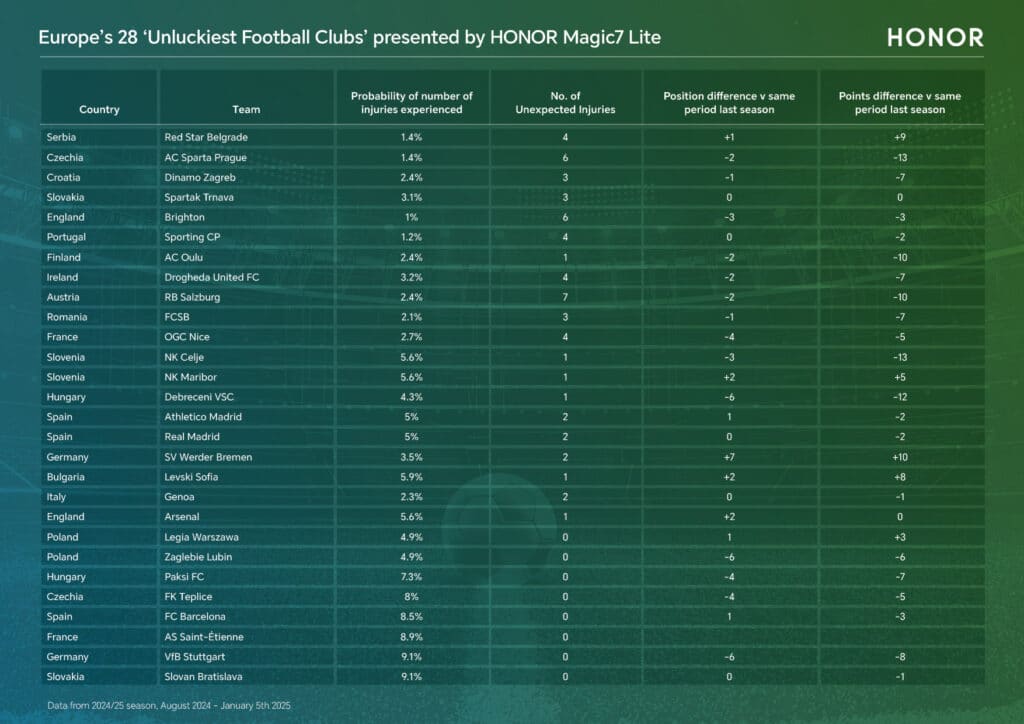With the transfer deadline fast approaching, a new data analysis commissioned by HONOR, marking the launch of the robust Magic7 Lite, provides an in-depth look at the impact of player injuries on European football clubs. The analysis reveals critical insights into which teams could benefit from securing new signings ahead of the 3rd February deadline.
HONOR partnered with football data analyst Daniel Wold and Oxford University mathematician Dr. Tom Crawford to examine injury data from the 24/25 European football season. The analysis identifies Europe’s 28 “Unluckiest Football Clubs,” those that faced an unexpected number of injuries in the first half of the season (August 2024 – January 2025). This data reveals the teams most at risk of losing valuable ground in the league standings and highlights the urgent need for strategic transfers to mitigate the effects of player injuries.
Brighton & Hove Albion Leads the Injury Table
Among English clubs, Brighton & Hove Albion was revealed to be the unluckiest team, both in the European rankings and in the Premier League. With a staggering 10,620 minutes lost due to injury, Brighton saw a significant drop of three positions compared to last season, suggesting that immediate reinforcements are essential to help the team recover its lost momentum.
In contrast, Arsenal displayed impressive resilience, managing to hold their ground despite enduring 7,470 minutes of injury time. Their ability to cope with setbacks allowed them to climb two places in the league standings compared to the previous season, reducing the urgency for further transfers.
A Stark Contrast in Injury Experiences
The data analysis predicted that Premier League clubs would suffer an average of 18 injuries in the first half of the season. Brighton dramatically exceeded this prediction, suffering six more injuries than expected. Arsenal, on the other hand, experienced one more injury than forecasted. This disparity highlights the vastly different injury challenges faced by these two clubs.
The analysis also established that injuries typically result in a significant loss of points and league positions. On average, one point is lost for every 177 injury days, and clubs typically drop one position in the standings for every 542 days lost to injury.
The Strategic Importance of Transfers
The findings underscore the importance of strategic decision-making during the transfer window. Teams must prioritise squad resilience to withstand the inevitable physical challenges of the game. Adebayo Akinfenwa, former professional footballer, commented on the critical role of resilience: “Injuries are a game-changer. They can derail even the strongest teams. This transfer window, clubs need to focus on squad resilience – it can be the difference between success and failure.”
A Snapshot of Resilience Across Europe
While some teams have struggled to cope with injuries, others have defied expectations. Serbia’s Red Star Belgrade, despite suffering the highest number of unexpected injuries in Europe, managed to increase both their points (+9) and league position (+1), standing out as a remarkable example of resilience. In contrast, Hungary’s Debreceni VSC faced the highest losses in both position (-6) and points (-12), showcasing the significant impact injuries can have on a team’s performance.
Action Required as Deadline Approaches
As the January transfer window draws to a close, clubs like Brighton & Hove Albion must act quickly to secure the necessary reinforcements to safeguard their performance in the second half of the season. The HONOR Magic7 Lite, much like the players themselves, embodies the importance of durability and resilience, as clubs face the physical toll of a challenging football season.

